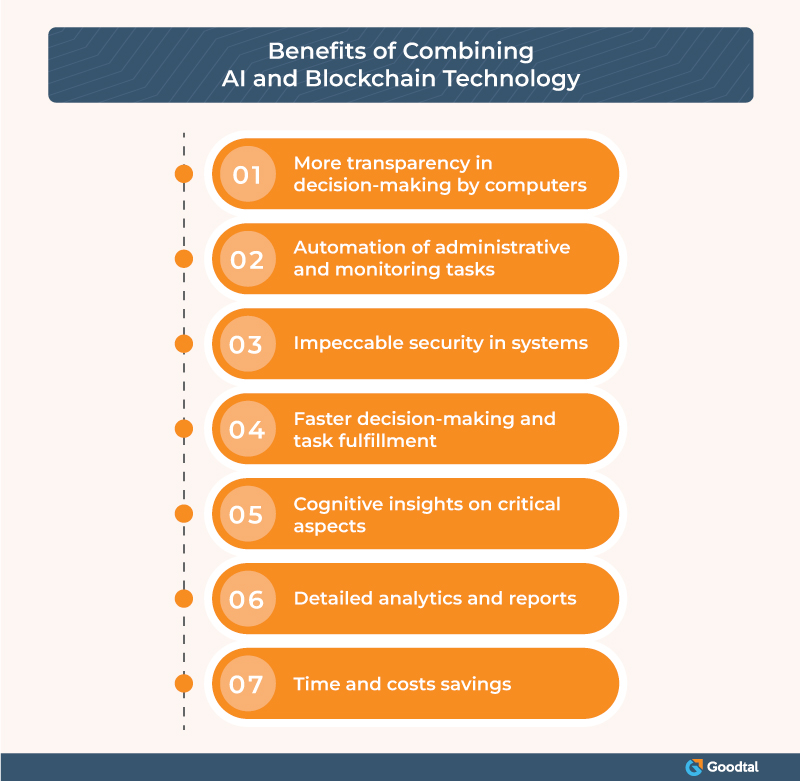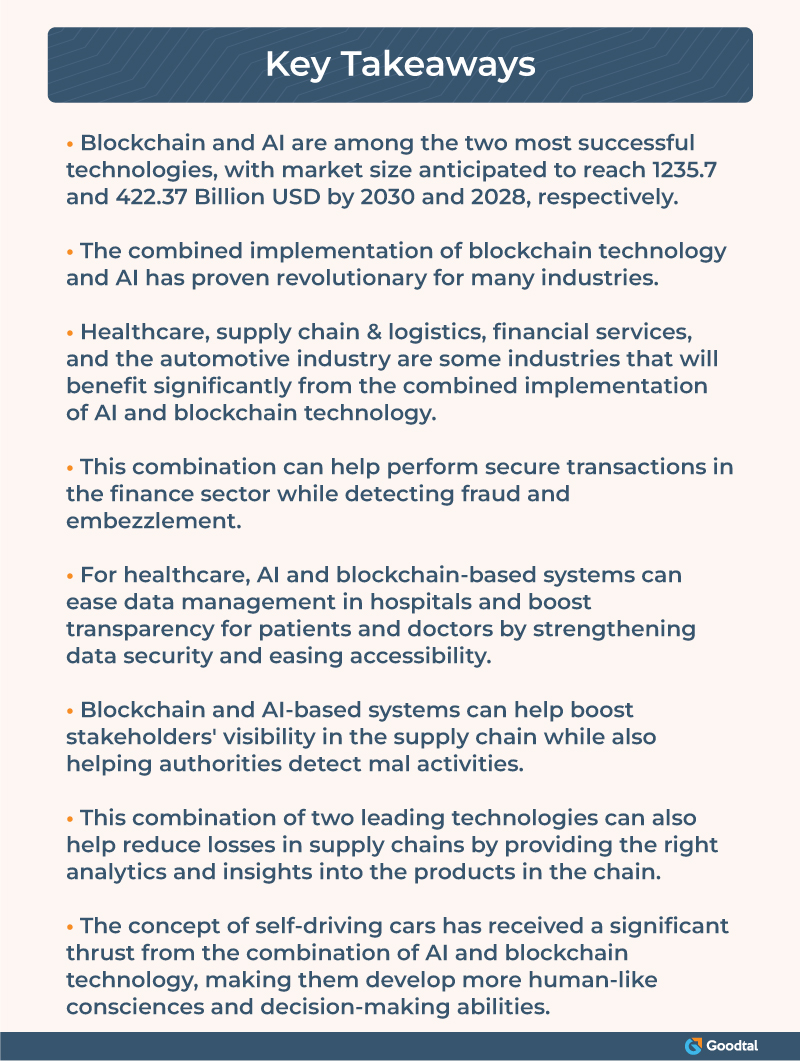
Blockchain and Artificial Intelligence, aka AI, are two of the most groundbreaking technologies of the 21st century. Blockchain technology has made a long-lasting impact on the finance sector, along with many others, namely, supply chain management, logistics, healthcare, etc.
Top blockchain developers are today trying to find means to expand the horizon of this technology by implementing it with other breakthrough technologies.
Meanwhile, AI has found its use in almost every sector functioning today, be it healthcare, cybersecurity, education, logistics, agriculture, autonomous vehicles, and much more. AI is one of the most successful technologies of all and has become a part of daily life for almost every person who uses smartphones.
We have seen both of these technologies transform every sector they are used in, but in this post, we'll focus on how these two together are forging a new, safer, secure, and productive future. So, let's move forward and discover how blockchain technology and AI are promising us a better future in unique ways.
Before moving forward, let's briefly check these technologies and their achievements in various fields.
Blockchain Technology
Blockchain has emerged as a revolutionary technology, and businesses are racing to harness its benefits by implementing it in their business models. The worldwide blockchain technology market valuation is anticipated to reach USD 1235.71 billion by 2030, up from the 5.85 billion USD mark in 2021. These numbers indicate that blockchain technology adoption will rise exponentially in the coming years.

Blockchain technology is a decentralized and distributed ledger spread across a group of peer-to-peer networks through nodes. This ledger is immutable thanks to the added cryptography, a feature that makes this technology very much desirable in the sector of cybersecurity.
Suggested Reading: Applications of Blockchain Technology in 8 Major Industries
Artificial Intelligence
Artificial intelligence does not need an introduction; it's famous not only among techies and businesses but also among commoners. Everybody knows it as a technology that makes machines think like humans through computer programming and algorithms. AI has become a household name owing to its implementation in almost every smart object available today.
According to Bloomberg, the Global AI market is anticipated to reach 422.37 billion USD by 2028, up from 59.67 billion USD reported in 2021. Behind this humongous growth lies the rapid and widespread adoption of AI in smartphones for authentication purposes and as a supporting technology for wearable devices.
Suggested Reading: Ways AI is Transforming Business Processes
What Ways Blockchain and AI Are Bringing Revolution
We all know that blockchain and AI are two of the most revolutionary technologies, but their combination stands on another level. The combined use of these technologies has proven to be very profitable and efficient for many sectors. Before discussing some of the best examples of the combined implementation of blockchain technology and AI, let's look at the benefits of this combination.

Finance
Blockchain has proven itself to be a very effective technology in the field of finance. Blockchain-based financial systems are considered one of the world's most secure and robust. There are numerous examples of blockchain implementation in the banking and finance world, the most popular being cryptocurrencies such as Bitcoin, Etherum, Hyperledger, etc.
Meanwhile, on the other side, AI is all about processing large chunks of data and carrying out different types of analytics on it. Using the Ml model, AI learns as it spends more time in the system about every intricate detail related to transactions or participants' banking behavior.
With the implementation of blockchain technology, the finance sector has overcome its most serious concern, security, to a significant extent. The decentralized nature of blockchain technology provides a further boost to this sector by removing third-party authorities from transactions such as banks leading to faster transactions. But as we know, every coin has two sides; blockchain-based payment channels do face some serious concerns regarding embezzlement and hefty illegal transactions.
The combination of AI with blockchain can solve these problems to a considerable extent. An AI-powered system can be wrapped as a layer on the blockchain ledger to detect transaction anomalies.
For example, consider an ordinary person who has been saving a particular amount and depositing 1K USD every month, but suddenly they start to put 1 million USD every month in their account. In such a case, after analyzing every data gathered on that particular member, the AI system can raise the flag pointing to any suspicious activity, thus raising awareness among ledger administrators of potential illegal activity.
Healthcare
Healthcare is a sector subject to continuous innovation and experimentation with up-and-coming technologies. And innovation is highly recommended in this sector as more advanced healthcare becomes, more lives can be saved, and quality of life can be improved.
Artificial intelligence has led a groundbreaking series of innovations in healthcare in many ways, such as the early detection of cancer and other diseases. And predicting the proper procedures and treatment by analyzing data regarding a patient's medical history and available treatments. For AI to do these things, it requires as much data as possible; the larger the amount of data, the more accurate the predictions and diagnoses will be.
Moving further, collecting data is simpler compared to the difficulties the administration might face in storing and managing it. Blockchain technology implementation can considerably help sort and ease this data storage and management issue.
As we know, blockchain ledgers are highly effective when it comes to data management and data security. Hence we can store all the available data that is to be used by AI to carry out the analytics in blockchains.
Blockchain-based record management systems will boost transparency amongst patients and doctors due to their decentralized and distributed nature. Blockchain will also ensure data security owing to its immutable nature, thus removing any insecurities related to treatments and diagnoses received by the patient. On the other hand, it will also help doctors get a clear picture of the patient's condition and allergies, thus deriving the proper treatment method.
Supply Chain Management & Logistics
With rapid globalization, supply chains are becoming more complex, thus making their management more challenging as businesses expand their horizon to more continents. Blockchain has made some significant contributions in supply chain management to reduce the complexities that lead to less visibility and poor synchronization between stakeholders and various departments.
As we know, AI can effectively analyze large amounts of data and give insights into various aspects of the supply chain. AI can be integrated into the blockchain-powered system to analyze all the stored data and store reports generated by it for future uses. This blockchain-powered supply chain management can be more efficient, accurate, and profitable with AI.
AI can detect fraud and suspected behavior anywhere in the chain by analyzing transaction details and other finance-related reports. In case of error, it can raise the flag and provide deep insight into the details so that the administration can pinpoint the exact place where it occurred. Moreover, it can also help you keep tabs on products that are about to expire or are kept in the wrong surroundings.
This is how AI and blockchain technology-based supply chain management systems can save money for businesses by warning them of possible thefts and the health of the products part of the chain.
Automotive Industry
The automotive industry has witnessed rapid transformation with breakthrough technologies such as AI. The concept of autonomous vehicles has received a significant thrust from AI technology, leading to several of them running on the streets today.
Today automotive industries are looking for ways to incorporate blockchain along with AI in autonomous vehicles to improve data analytics and bring more data.
With ample data in the system, the self-driving algorithm that drives them will act more accurately, portraying human conscience. Blockchain-based AI systems can work wonders by making autonomous vehicles capable of making decisions such as refueling, air pressure check, maintenance updates, and more.
Car owners can eliminate their privacy and security concerns by employing blockchain-based systems. Blockchain, along with other data, can be used to save banking details and other such sensitive details.
Assume a scenario where your car, thanks to the AI-installed system, analyzes the vehicle running out of fuel and air. Further, it self-directs the vehicle to the nearest fuel station using GPS, and with the banking details stored in the blockchain-powered system, it makes the payment without any interference from the driver.
Sounds great, right? This concept will make cars on autopilot more efficient and capable of carrying out all other activities the driver might do while the passenger is taking a nap.
Wrapping Up
Blockchain and artificial intelligence have emerged as one of the most remarkable technologies of the 21st century. These technologies are promising in every sector they are implemented in, but their combination has proven to be groundbreaking. In this post, we listed some of the most promising and innovative use cases of blockchain and artificial intelligence in various sectors.
We briefly looked at how blockchain and AI boost security, efficiency, and productivity in every application they are employed in. We discussed some sectors, namely, finance, healthcare, supply chains, and the automotive industry, that have had the greatest impact from the implementation of blockchain technology and AI.

